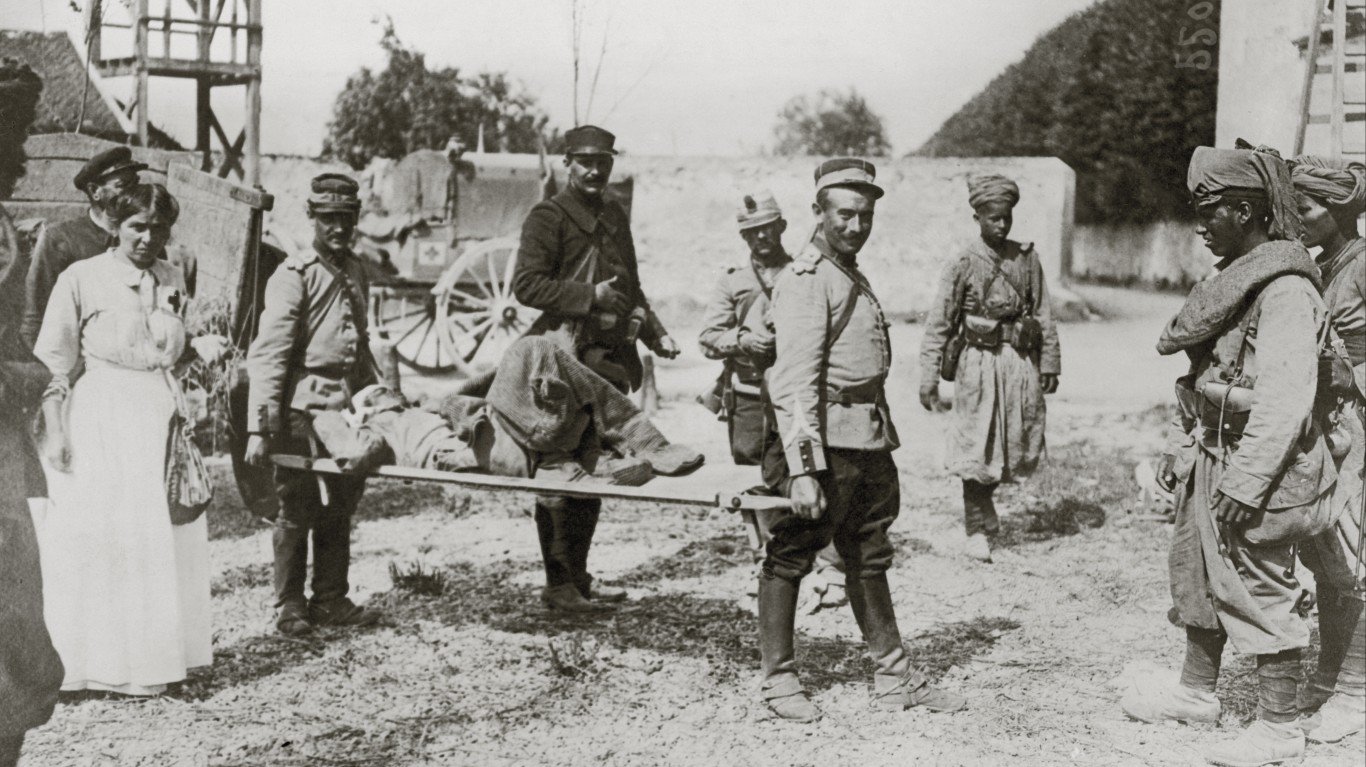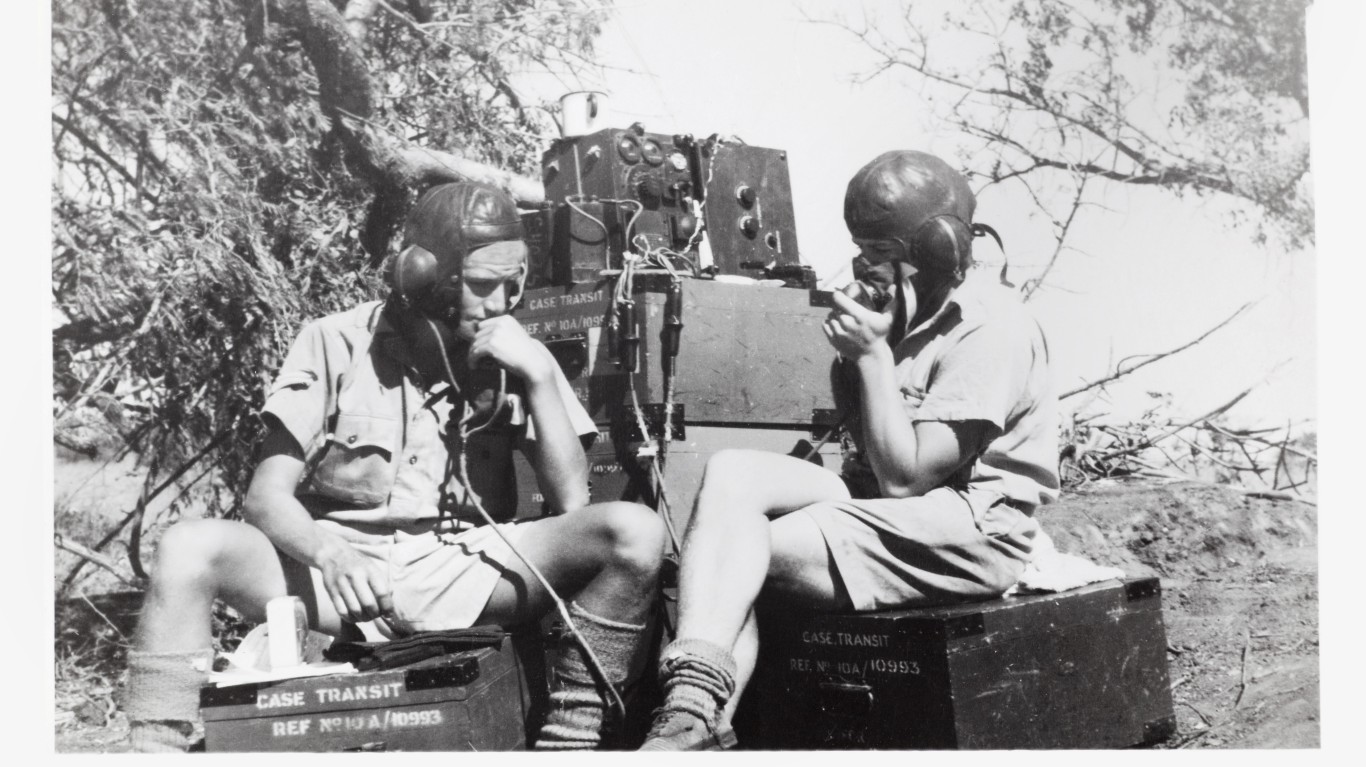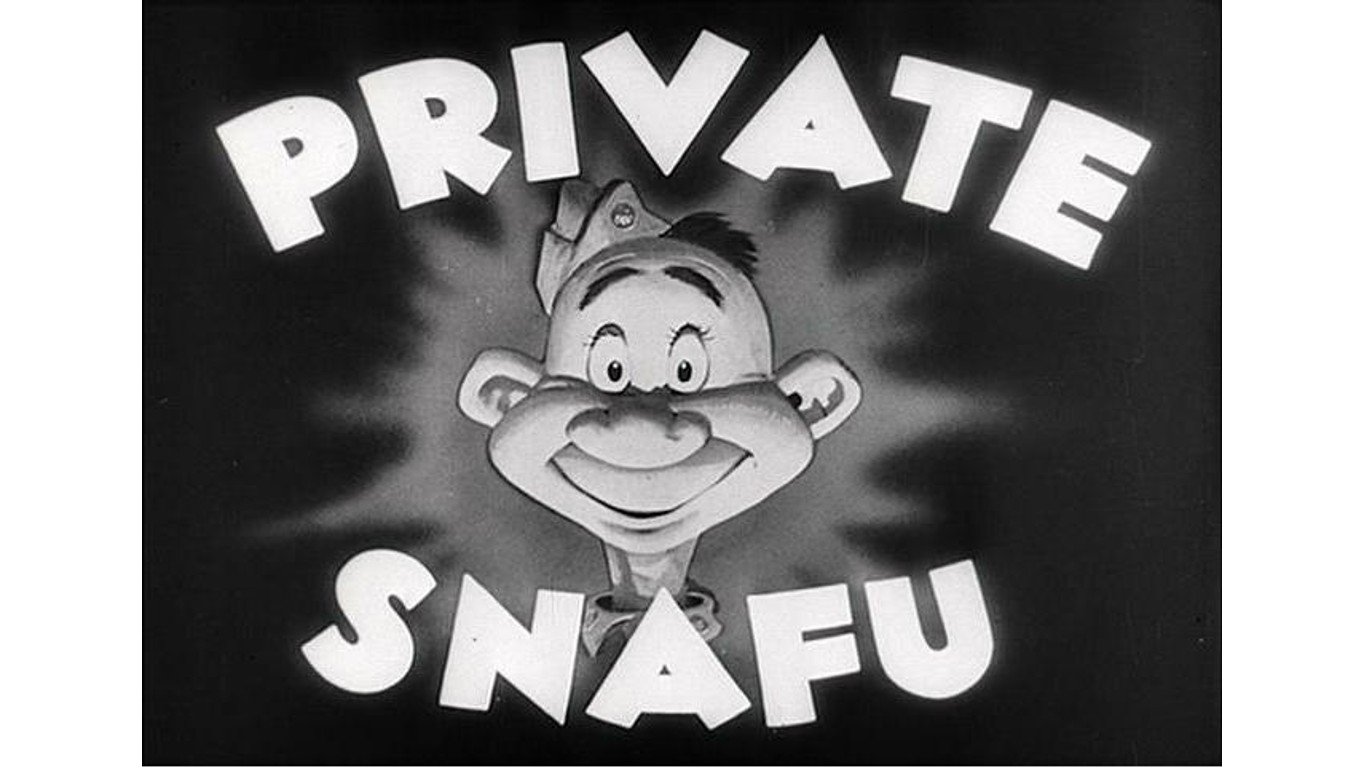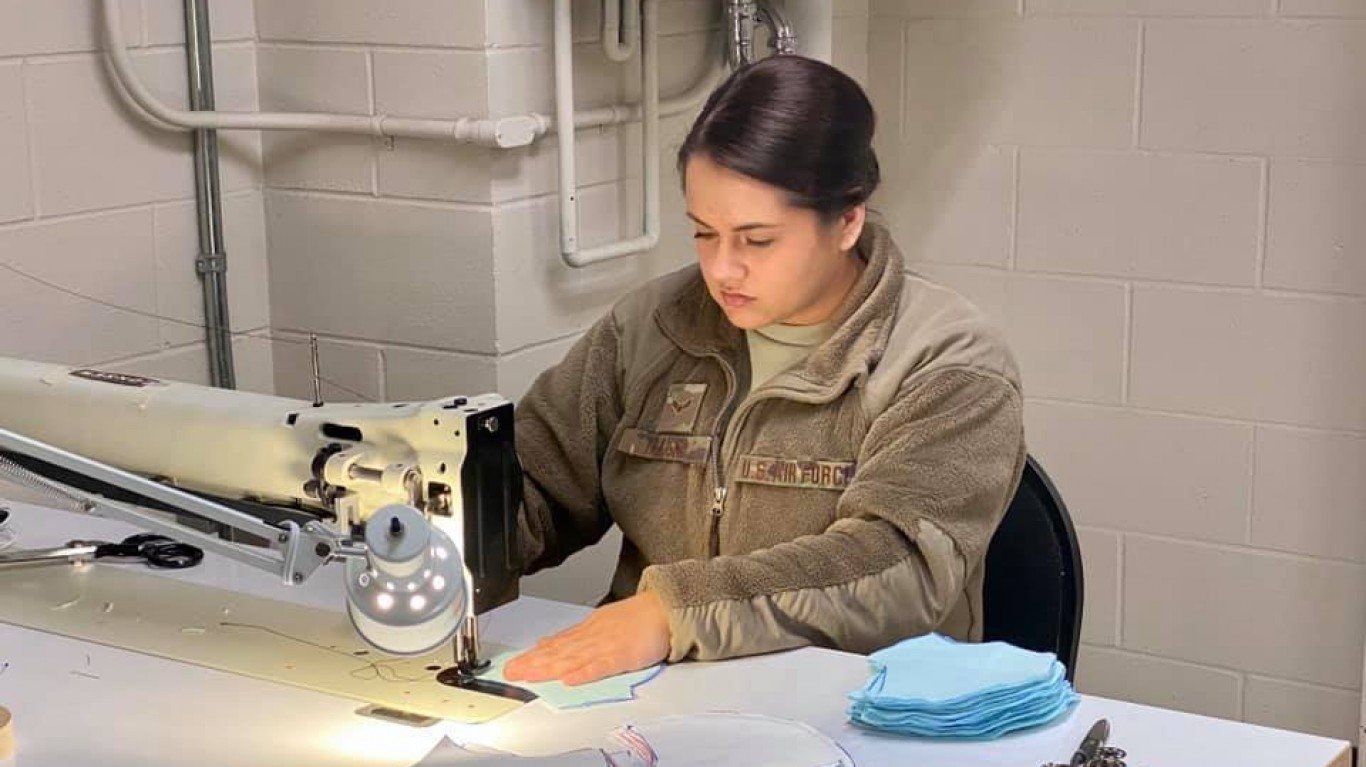

The American military has had an impact on popular culture, whether it’s movies, fashion, or your political preference. And for better or worse, the argot of the military has seeped into everyday language, and we commonly use terms derived from it without thinking about or realizing where they came from. (You might be surprised by the origins of these common English words.)
To determine the most popular phrases that originated in the military, 24/7 Tempo reviewed compilations of such phrases from the USO and other sources and did additional research into their origins in the Oxford English Dictionary and elsewhere. Phrases were listed alphabetically.
Some of the phrases on our list have been around for much longer than you think. When we hear the phrase “no man’s land,” we think of the shell-pocked landscape of northern France and Belgium during World War I. The first mention of a no man’s land actually dates from 14th-century England and refers to areas where bodies were buried.
Speaking of World War I, the Great War has provided us with phrases such as “in the trenches” and “above and beyond the call of duty.” Other older phrases with military origins include “on the double,” referring to marching in double time, and “on the front lines.”
Click here to read about 20 popular phrases that originated in the military
World War II and the post-war era gave us expressions such as the acronym “Snafu” and the phrases “gung ho,” derived from the Chinese language and adopted by the U.S. Marines, and “locked and loaded” – a phrase immortalized by John Wayne in the World War II-themed rouser “Sands of Iwo Jima,” considered one of the best war movies of all time.
One of the more recent military phrases on our list is “boots on the ground,” whose origins have been traced to 1980 during the Iranian hostage crisis.
1. “Above and beyond the call of duty”
This phrase originally referred to acts of bravery that go beyond what’s expected of a military serviceman or -woman. It originated during World War I and came to be used to describe Medal of Honor recipients.
[in-text-ad]

2. “Balls to the wall”
The popular saying has nothing to do with what you might think. It refers to military aircraft, in particular older aircraft. A pilot’s control levers had spheres, or balls, at the end of them. When pilots flew at top speed, they’d push the levers to their limit. The “balls” would be pushed toward the “wall” of the aircraft.

3. “Bite the bullet”
The phrase “bite the bullet” might date from the Civil War. Because of the lack of anesthetics or other pain-numbing medicine at the time, soldiers on both sides of the conflict used the term to refer to enduring pain without making noise, and would literally bite down on a bullet while undergoing a procedure.

4. “Boots on the ground”
“Boots on the ground” is a relatively new phrase, used to describe soldiers physically in a combat zone. According to William Safire in a 2008 “On Language” column in the New York Times, a U.S. Army historian found a reference to the expression, attributed to General Volney Warner, in a Christian Science Monitor story written during the Iranian hostage crisis.
[in-text-ad-2]

5. “Brass”
“Brass” originally meant higher-ranked military officers – possibly a reference to the decorative metal insignias on the uniforms of 19th-century British soldiers and their later American counterparts.

6. “Friendly fire”
“Friendly fire” is a term coined to describe accidental attacks on troops by their own side. The Poynter Institute credits Ben Zimmer of Language Log for finding the first citation of the phrase in the New York Times on Oct. 18, 1918, during World War I.
[in-text-ad]

7. “Going AWOL”
“AWOL” stands for “absent without leave,” and began as a way of describing members of the military who left their base or their post for extended periods without permission as early as 1767 in Britain. It was first used by the U.S. military during World War I, pronounced as four separate letters. During World War II, it was first pronounced as a single word .

8. “Gung ho”
“Gung ho” entered English as the motto of a U.S. Marine unit operating in the Pacific during World War II. It comes from a Chinese phrase meaning “work together” or “work in harmony” and was originally the slogan of a Chinese industrial company.

9. “Hooah”
“Hooah” (and its variants, “hooyah” and “oohrah”), used as a battle cry by members of various branches of the American armed forces, may date all the way back to a phrase uttered by a Seminole chief in the early 1800s. It might also be a World War II coinage – a pronunciation of the acronym “HUA,” meaning “heard, understood, and acknowledged” – an acknowledgement by soldiers that they’d received an officer’s orders.
[in-text-ad-2]

10. “Hurry up and wait”
A phrase that detractors would say sums up military life, “Hurry up and wait” is a reference to the practice of rushing soldiers to the front lines, only to make them wait for extended periods before they see action. It is probably a U.S. Army term from the 1940s.

11. “In the trenches”
Opposing armies have fought from trenches for centuries, but trench warfare was seared into the public consciousness during World War I, when “in the trenches” was used to describe that grinding style of combat.
[in-text-ad]

12. “Lock and load”
“Lock and load” means to load a weapon and engage its safety catch. The phrase appears as early as 1793, describing flintlock weapons, but owes its modern popularity to John Wayne, who said it in the 1949 film “Sands of Iwo Jima.”

13. “No man’s land”
The USO says the phrase dates from 14th-century England, where it was used to indicate the location of burial grounds on maps. It came into usage during World War I to mean the area between the trench lines of the opposing sides. The English war poet Wilfred Owen described the area “like the face of the moon, chaotic, crater-ridden, uninhabitable, awful, the abode of madness.”
14. “On the double”
“On the double,” whose origins are in the early 1800s, meant doing something in double time in the military – i.e., marching twice as fast.
[in-text-ad-2]

15. “On the front lines”
This phrase is one of the oldest in military history. It is recorded as early as 1520, but was first used to describe the first row of an approaching group of troops or the point at which opposing forces meet in 1842.

16. “Over and out”
“Over and out” originated with ham radio operators, and simply meant “My transmission is over” and “I’m out.”
[in-text-ad]

17. “Roger that”
A phrase used to acknowledge that a message or order that has been received and understood comes from the phonetic alphabet used by both U.S. and British military personnel during World War II, when radio operators used easily understandable words to avoid confusion. “Roger” stands for “received.”

18. “Snafu”
This is an acronym that stands for “Situation Normal: All Fouled Up.” (There is also a blue-language version of the phrase.) The expression dates from World War II, when it was associated with foot soldiers resigned to dealing with a predicament they had no control over.

19. “Stand down”
By its sound, “stand down” almost sounds like a contradiction in terms. It was originally a British phrase said to witnesses in court, meaning “leave the witness box,” and was adopted by the military to mean “come off duty” in 1916. The phrase was used by American GIs during the Vietnam War to describe going from the battlefield to a place of safety.
[in-text-ad-2]
20. “The whole nine yards”
The origin of this phrase is murky, but it might be a reference to the fact that fabrics were often sold in nine-yard bolts, and a complete outfit might take the whole thing.
Essential Tips for Investing: Sponsored
A financial advisor can help you understand the advantages and disadvantages of investment properties. Finding a qualified financial advisor doesn’t have to be hard. SmartAsset’s free tool matches you with up to three financial advisors who serve your area, and you can interview your advisor matches at no cost to decide which one is right for you. If you’re ready to find an advisor who can help you achieve your financial goals, get started now.
Investing in real estate can diversify your portfolio. But expanding your horizons may add additional costs. If you’re an investor looking to minimize expenses, consider checking out online brokerages. They often offer low investment fees, helping you maximize your profit.
Thank you for reading! Have some feedback for us?
Contact the 24/7 Wall St. editorial team.

 24/7 Wall St.
24/7 Wall St. 24/7 Wall St.
24/7 Wall St.



